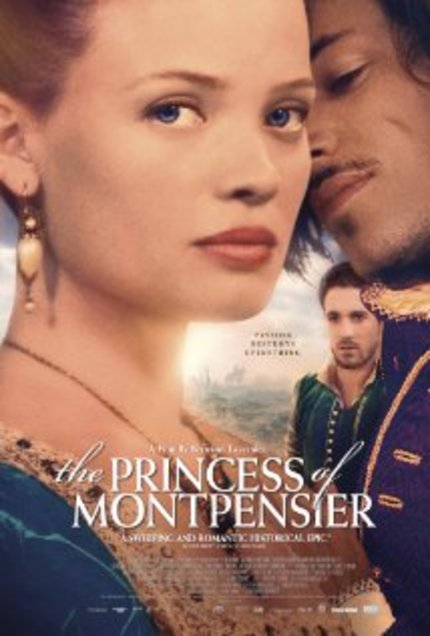THE PRINCESS OF MONTPENSIER Review

For a film with "Princess" in the title, it's fair to call the opening sequence fairly unexpected. It's 1567, and the France is caught up in a bloody religious war against the Huguenots. Armed men on horseback gallop at full speed, slashing any and all opposing forces in their path. Their fervor of battle takes them to a small cottage on the outskirts of the action, where innocent blood is spilled in an effort to weed out the enemy. This barbaric injustice is too much for Comte de Chabannes (Lambert Wilson) who following the incident casts off his sword and deserts combat.
He finds his way back to the royal court of Montpensier just as the prince (Gregoire Leprince-Ringuet) is entering an arranged marriage with beautiful young Marie (Mélanie Thierry) - one that effectively ends her passionate yet abstinent relationship with the dashing rogue Henri de Guise (Gaspard Ulliel). Marie - the titular princess of the film - is clearly spirit-broken, but over time, learns the ways of loveless submission. For a time, it even appears that the new young couple may overcome their natural mismatched personal natures. Could it be that love conquers all and this princess gets her fairly tale happily ever after with her prince charming? Guess again. Ultimately, at the peak of the soap opera, four different men are in some way vying for her affection. Some have a shot with her, some may forever pine away. The combination of the very nature of this headstrong heroine coupled with the wartime uncertainty that dominates the lives of her suitors amounts to one five-side triangle of misdirected desire that cannot be tidily resolved.
Although the performances, costumes, and scenery are all top notch, Tavernier's direction is the single most impressive aspect of the film. Though the camera never calls attention to itself, there is never a dead spot in the action on screen. Relying upon the sort of visual choreography that harkens back to Jean Renoir's "The Rules of the Game" rather than editing, Tavernier has taken what is generally a considerably more difficult approach to storytelling that, in this day and age may very well go unnoticed, but nevertheless, and quite appropriately, never lets the film settle. Examination of practically any shot involving more than two people talking reveals a delicate and subtle fusion of camera movement and on-screen elements. For example, a group of men on horseback may gallop through the frame, and just as the camera begins to lose them in the trees, another group will enter the frame from the other side, continuing at the established clip of the first. Someone may cross the frame in the foreground in just the necessary moment to cover any "dead space" in the action. Everything flows in an energetic harmony of dignified continuance.
As a five-way romance, "The Princess of Montpensier" bites off a few more possible lovers than necessary, leaving most savvy audience members knowing full well that at least two of them stand no real chance with Marie. As a history lesson, it certainly seems to strive for accuracy on all fronts (although not being a student of the era, I'm not qualified to say if it is truly accurate). Certain royal rituals that Marie and the prince are subjected to, including an open-door nude ceremonial scrubbing of the bride followed by an observed first bedding of the new stranger couple go beyond the impersonal and into the realm of horrific indignity. It's a fascinating look at what passed for ritual among the loveless French hierarchy of 400+ years ago.
As a wartime costume drama, both the war and the costumes resonate. As a coming of age story of a headstrong young woman thrust into a marriage she does not want or desire, the war almost serves to free her of her circumstances in her husband's time of deployment, allowing her to spend time with the Count, learning reading and writing and whatnot. Through this betterment of self she finds a value in life, for a time.
Watching Marie's long-brewing process of attempting to come to terms with her lot in life - relational submission - is a theme that many films would tout as an opportunity to espouse modern feminism. To do so in this context would border on dishonesty, and would be entirely unnecessary, considering that submission is by no means a dead issue in today's modern world; it's merely taken different forms and contexts. "The Princess of Montpensier" does not fall into such a trap, and consequently maintains a more timeless dignity, even honesty, that is both historically viable and that carries weight in the modern day as well.
- Jim Tudor
The Princess of Montpensier
Director(s)
- Bertrand Tavernier
Writer(s)
- Jean Cosmos
- Madame de La Fayette (short story)
- François-Olivier Rousseau
- Bertrand Tavernier
Cast
- Mélanie Thierry
- Lambert Wilson
- Gaspard Ulliel
- Grégoire Leprince-Ringuet

Do you feel this content is inappropriate or infringes upon your rights? Click here to report it, or see our DMCA policy.






